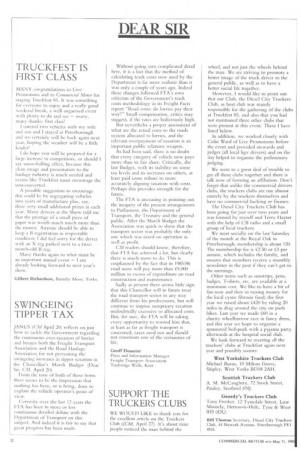SWINGEING TIPPER TAX
Page 34

If you've noticed an error in this article please click here to report it so we can fix it.
JANUS (CM April 20) reflects on just how to tackle the Government regarding the continuous over-taxation of lorries and berates both the Freight Transport Association and the Road Haulage Association for not preventing the swingeing increases in tipper taxation in the Chancellor's March Budget (Dear Sir, CM, April 20) From the tone of both of these items there seems to be the impression that nothing has been, or is being, done to explain the vehicle operator's point of view.
Certainly over the last 12 years the FTA has been in more or less continuous detailed debate with the Department of Transport on this subject. And indeed it is fair to say that great progress has been made, Without going into complicated detail here, it is a fact that the method of calculating track costs now used by the Department is far more realistic than it was only a couple of years ago. Indeed these changes followed FTA's own criticism of the Government's track costs methodology in its Freight Facts report "Road costs: do lorries pay their way?" Small compensation, critics may suggest, if the rates are ludicrously high.
But neverthelss a proper assessment of what arc the actual costs to the roads system allocated to lorries, and the relevant overpayment of taxation is an important public relations weapon.
As had been said, there is no doubt that every category of vehicle now pays more than its fair share. Critically, the last Budget, with its stability on some tax levels and its increases on others, at least paid some tribute to more accurately aligning taxation with costs. Perhaps this provides strength for the future.
The FTA is unceasing in pointing out the inequity of the present arrangements to Parliament, the Department of Transport, the Treasury and the general public. After the March Budget the Association was quick to show that the transport sector was probably the only one which was taxed on operation as well as profit.
CM readers should know, therefore, that FTA has achieved a lot, but clearly there is much more to do. This is emphasised by the fact that in 1985/86 road users will pay more than £9,000 million in excess of expenditure on road construction and maintenance.
Sadly at present there seems little sign that this Chancellor will in future treat the road transport sector in any way different from his predecessors, but will continue to iinpOse sumptuary taxation undoubtedly excessive to allocated costs. But, for sure, the FTA will be taking every opportunity to remind him that, at least as far as freight transport is concerned, taxes need not and should not constitute one of the certainties of life.
Geoff Dosseter Press and Information Manager Freight Transport Association Tunbridge Wells, Kent




























































































